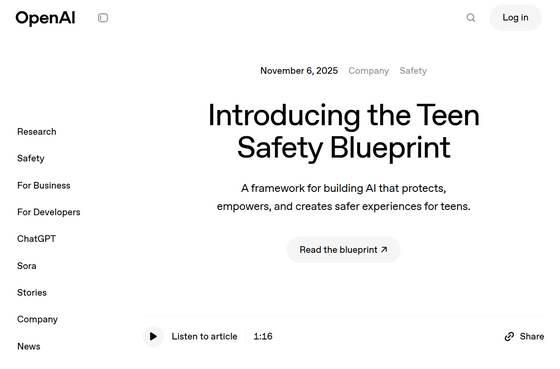OpenAI publishes 'Five Proposals for AI Companies' for politicians to set safety standards for teenagers using AI

On November 6, 2025, OpenAI published the Teen Safety Blueprint, a proposed set of safety standards for teenage AI use. This is OpenAI's roadmap for building AI tools responsibly and serves as a practical starting point for policymakers working to set standards for teenage AI use, helping define how AI should work for teens, including age-appropriate design, meaningful product protections, and ongoing research and evaluation.
Introducing the Teen Safety Blueprint | OpenAI
https://openai.com/index/introducing-the-teen-safety-blueprint/

Exclusive: OpenAI unveils blueprint for teen AI safety standards
https://www.axios.com/2025/11/06/openai-blueprint-teen-ai-safety-standards
OpenAI has proposed five points for AI companies to follow:
1: Identify teens on the platform and treat them age-appropriately.
2: Reduce risks to minors by prohibiting depictions of suicide or self-harm, intimate content, and violent content.
3: If there is any doubt about a user's age, default to an under-18 experience.
4: Provide parental controls that allow families to manage their children's accounts.
5. Incorporate features based on the latest research on youth and AI.
In addition, OpenAI explains that it is implementing this framework into its products without waiting for regulations to catch up, including strengthening protections for young users, introducing parental control features with proactive notifications, and building an age prediction system to determine whether a user is under 18 and adjust the ChatGPT experience appropriately.
OpenAI acknowledged that its safety measures are still ongoing, but said it will build and continuously improve its AI responsibly by learning from parents and experts.

Axios believes OpenAI is trying to preempt criticism by appealing to policymakers and shape the norms surrounding teenage use, pointing out that this comes as states across the U.S. are considering AI safety laws and a senator has introduced a bill to ban chatbots targeted at minors.
Axios also pointed out that OpenAI is trying to expand its user base by promoting the introduction of AI into schools, which require a safety framework. Amid a high-profile lawsuit over the suicide of a young person who interacted with a chatbot, OpenAI is facing scrutiny over its response to the safety of young users.

Axios also points out that age verification on platforms is very difficult and can be easily circumvented by children, and that companies will benefit from incorporating safety measures early on, as they may face stricter requirements such as the European Digital Services Act (DSA).
Related Posts:







